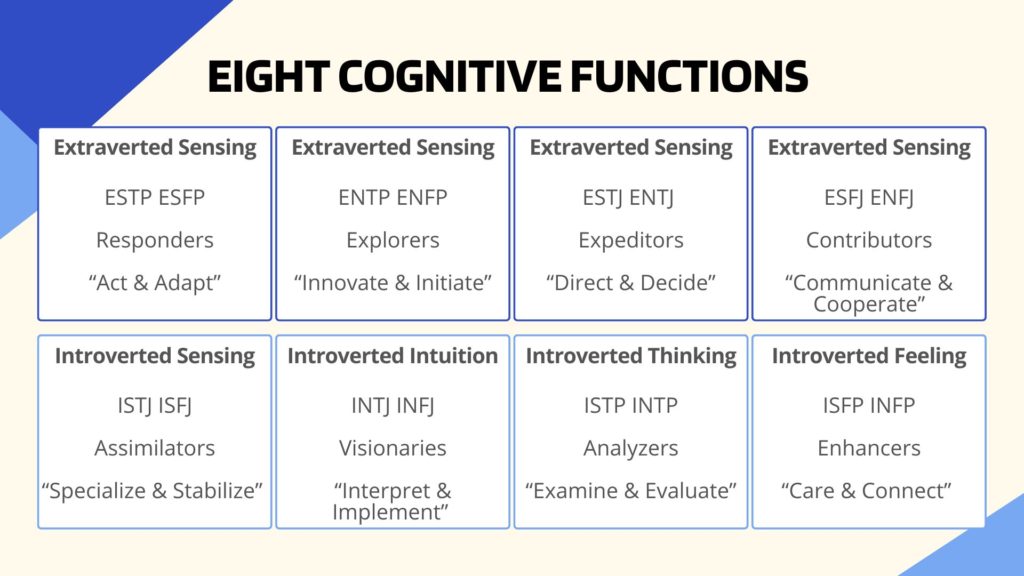The 16 MBTI types can be simplified into 8 Cognitive Functions
Important to remember:
- Everyone uses all 8 functions
- Our type determines our ability to use each function
- 2 will serve as our strengths
- 2 will serve as our weakness or blind spots
- The remaining 4 are our “Shadow Functions”, in our unconscious. Often displayed during stress
- All functions are equally valuable
The Eight Cognitive Functions
- Extraverted Sensing (SE)
- Introverted Sensing (SI)
- Extraverted Intuition (NE)
- Introverted Intuition (NI)
- Extraverted Thinking (TE)
- Introverted Thinking (TI)
- Extraverted Feeling (FE)
- Introverted Feeling (FI)
The Dominant Function
4 of the Cognitive Functions are based on “Perception”, how we take in information (S or N) The other 4 are based on “Judging”, how we make decisions (T or F)
Everyone has one favorite function among the four mental functions (S, N, T or F). Everyone uses that favorite function in their favorite (Extraverted or Introverted) world. This is what determines our Dominant Function.
- Also referred to as our Hero/ Heroine Role
- It is our default function when called to “Save the Day”
- Our natural strength
- How we are “Hard-Wired”
- Our strongest function, usually well developed by age 13
- Often the only function developed at this age.
The Auxiliary Function
We each also have an Auxiliary Function. This is our 2nd strongest function. It is also referred to as our Supportive Parent Role because we use it in a positive, helpful, and supportive way.
It is also usually the one we start with when lending help and support to others.
90% of our personality is made of these two functions: our Dominant & Auxiliary

MICHELE BURCH REID, MS FOUNDER OF LCI
More From Michele
ESTP Personality Types in Relationships
ESTP The Doers To read additional posts on other MBTI types Understanding your personality type and the type of those around you can improve communication, relationships, intimacy, team, and organizational productivity, employee engagement & retention,...
Time Management for “P” Perceiving Types- Myers-Briggs
Time Management for "P" Perceiving Types. A study by Meri Hicks Beckham outlines how Perceiving types manage time and why it is effective for the type. "J" judging types read also. This will help to give insight and hopefully reduce your frustration with the time...
Personality Type & Relationships- ISTP
Personality Type & Relationships- ISTP Understanding your personality type and the type of those around you can improve communication, relationships, intimacy, team, and organizational productivity, employee engagement & retention, satisfaction, enjoyment...






